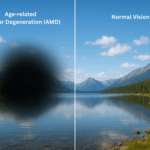Did you ever know what you consume or eat does not just affect your body shape, weight and health? In fact, an individual’s diet can also impact their eye health and cause some irreversible damages.
Does too much salt affect your eyes?
Salt is important and essential in almost every recipe to make it tasty, but did you know the high level of sodium can increase the risk of having high blood pressure. Salt will not only bloat our body and affect our body tissues, it will also lead to the restriction of blood flow to our eyes when the blood pressure is high.
Hypertension due to raised systemic blood pressure (BP) both diastolic and/or systolic is associated with stroke, cardiovascular, renal or ocular disease. Researchers have shown high blood pressure as a significant risk factor for glaucoma progression. Glaucoma is a common blinding disease which is due to damage to the optic nerve and raised intraocular pressure. Therefore, too much salt can increase overall blood pressure and lead to an increase of intraocular pressure.
Is it too sweet for the eyes?
Diabetes is a disease that occurs when the blood glucose levels are too high and people living with diabetes are at greater risk of developing eye problems. When the body does not produce enough insulin or does not produce any insulin, it will remain in the blood and not reach any cells causing an increase of glucose in the blood. Diabetes damages the blood vessels all over the body.
Diabetic retinopathy is the most common diabetic eye condition. It damages or changes your eyes by blocking the tiny blood vessels that go to the retina and lead to swelling or bleeding. In some serious conditions, the new blood vessels may grow on the surface of the retina. Diabetes retinopathy can appear in patients with either Type 1 or Type 2 and if the condition is left untreated, there is a chance to cause blindness.

The long term result of having diabetes can result in developing a cloudy substance in the lens which is known as cataract. Cataract develops for multiple reasons and most commonly is age-related whereas diabetes also increases the risk of getting cataract. The risk of developing cataract in diabetes patients is caused by the changes of tissues in the eyes that make up the eye’s natural lens.
In conclusion, poor diet control will be a risk for the health of your eyes. However, you can prevent and lower the risk of developing eye problems by just making a few changes to your diet. Having a healthy and well-balanced diet that includes lots of fruits, vegetables and lean proteins is important for most people to get the right nutrients for eye health. Those with vision problems and those with very restrictive diets should talk to an eye professional about the right foods to eat for their eye condition. An eye health professional can help you create a diet that suits you and reduce the chances of developing age-related eye diseases.







